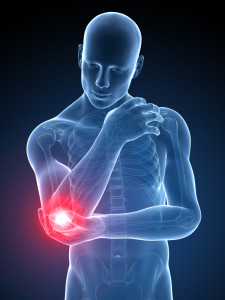The elbow joint can experience a tremendous amount of stress, causing pain and loss of mobility. For state-of-the-art orthopedic treatment and arthroscopic elbow surgery in Reading, PA and throughout Berks County, consider a consultation with Dr. Stephen Soffer.
 Dr. Stephen R. Soffer is a distinguished board-certified orthopedic surgeon who is fellowship trained by the world-renowned sports surgeon, Dr. James Andrews. He is a leading expert in arthroscopic surgery of the knee, shoulder and elbow and specializes in the treatment of many sports-related injuries.
Dr. Stephen R. Soffer is a distinguished board-certified orthopedic surgeon who is fellowship trained by the world-renowned sports surgeon, Dr. James Andrews. He is a leading expert in arthroscopic surgery of the knee, shoulder and elbow and specializes in the treatment of many sports-related injuries.
Dr. Soffer is widely recognized as the regional leader in comprehensive orthopedic services. His vast expertise has earned him inclusion as one of Castle Connolly’s America’s Top Doctors® in Orthopedic Surgery and one of U.S. News & World Report’s Top Doctors for the last five years.
About the Elbow
The elbow is located where the two bones of the forearm – the radius and the ulna – meet the humerus bone of the upper arm. It is comprised of bones, cartilage, tendons, muscles, ligaments, and three joints.
The hinge-like humeroulnar joint is what is most people commonly think of as the elbow joint. It allows you to bend and straighten your arms. But there are two other important joints that make up the elbow.
The humeroradial joint, formed where the radius and humerus meet, not only helps you bend and straighten your arms, but also allows you to turn your hand over so that your palm can face up or down. And the proximal radioulnar joint, formed where the radius meets the ulna, allows you to rotate your lower arm.
Elbow Treatments
If you injure an elbow or have painful arthritis that interferes with the movement of your arm, non-surgical treatments, including rest, physical therapy and medications, may help.
Injuries and arthritis can also damage the ends of the bones and cause bone spurs to develop, resulting in pain and limited motion. Surgery may be an option, and Dr. Soffer will work with you to devise a proper treatment course that will lead to the best outcome. Elbow surgery options may include:
- Arthroscopic Surgery
Elbow arthroscopy is a minimally invasive procedure that can be used to assess cartilage damage, diagnose tendon tears, smooth out cartilage, remove loose fragments of cartilage and bone spurs, cut away damaged tissue in tennis elbow, and repair soft tissue tears.
Arthroscopic surgery can be effective treatment for many types of elbow injuries, particularly for athletes with “thrower’s elbow,” a painful condition that causes pain on both the inside and outside edges of the elbow and limits movement. This condition is often seen in baseball pitchers, football quarterbacks, and athletes who play tennis, cricket, volleyball, throw a javelin, and a variety of other sports. The surgery is also useful for removing bone spurs in the early stages of elbow arthritis.
- Elbow Fracture Repair
Elbow fractures may be caused by a fall, a direct impact to the elbow, or a twisting injury to the arm. Many fractures can be healed by immobilizing the elbow in a cast, but some, depending on which bone was fractured and how badly, may need surgery to re-align the bones and, in some cases, hold them together with metal plates or screws while they heal.
- Elbow Joint Replacement
Severe fractures or arthritis may benefit from elbow replacement surgery, called elbow arthroplasty. This involves removing the damaged components of the joint and replacing them with metal and plastic implants. The implants are then joined together to form a hinge.
Dr. Soffer provides comprehensive evaluation and management for a wide range of elbow problems, including throwing injuries, tennis elbow (inflammation of tendons around the elbow joint caused by overuse), elbow fractures, arthritis of the elbow, and cubital tunnel syndrome (nerve pain in the elbow).
Orthopedic surgeons, like Dr. Stephen Soffer in the Reading, PA area, have extensive training in elbow treatment. To find out if surgery could help resolve your pain and discomfort, schedule an appointment today with Dr. Soffer.



